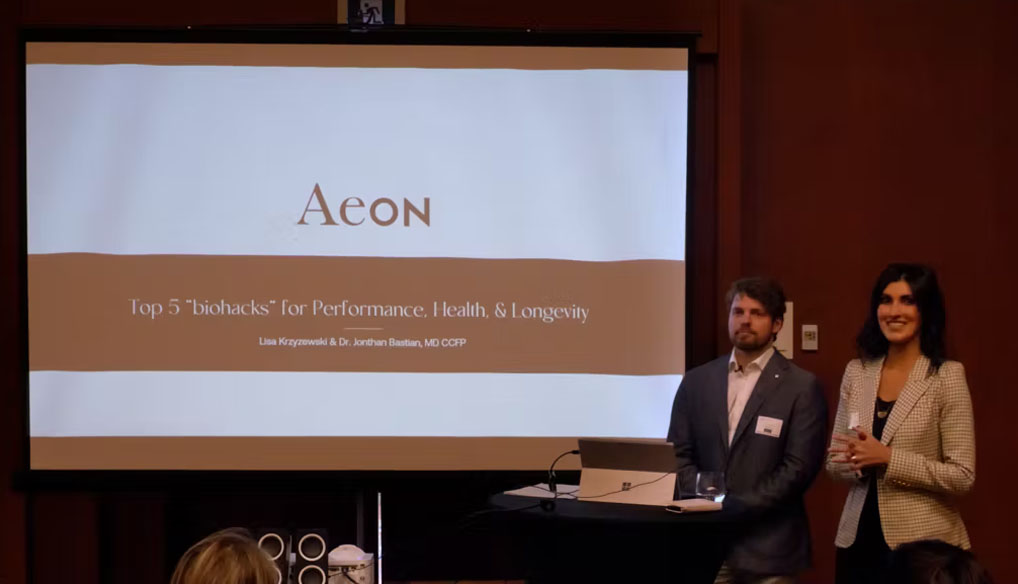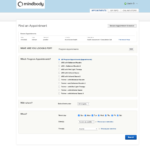Dr. Johnathan Bastien and Lisa Krzyzewski present the Top 5 “biohacks” for Performance, Health and Longevity at EO Calgary’s Biohacking Mini Conference.
Show Notes
All right, so, we’re going to get started. I’m Lisa Krzyzewski, founder of Aeon Future Health. And I’m here today with Dr. Jonathan Bastian, who is my partner and medical director at our facility. Together, we’re on a mission to reverse your biological clock with the latest technologies and treatment protocols. It is longevity medicine, but we would also call it “biohacking”. So, let’s talk a little bit about what biohacking is all about. Like the term or not, I would say everybody in this room is probably an amateur biohacker. Who woke up really tired this morning, or was worried about the mid-day slump and energy. Yeah, and who survived that via coffee?
Lisa (00:52):
Yeah, caffeine! Caffeine is probably the number one national biohack. There’s so much that it helps us survive. And so, when we think of what are those situations we’re in that we don’t have the luxury of manicuring and setting up to work best for us. Time is one of those big ones, right? Time is upon us. Every day we’re aging a little bit more, we’re becoming more susceptible to disease. We probably are going to go home and have that second glass of wine to unwind, but it might kill off a few brain cells in the process. We might stay up late working on a report, wake up tired the next morning, and then it’s rinse repeat because none of us are getting off the treadmill right now. We’re in our prime, we’re professionals, we’ve got lots of responsibility. So, the key with biohacking is to be intentional about it and use it so you can do the life you want, but still have great health and start managing that aging process and hopefully start reversing some of those effects.
Johnathan (02:02):
Really, if we think we can affect aging or improve your health by even 3 to 5% in every major category of your health; your sleep, your diet, your exercise routine, that cumulative 15% improvement in your health leads to a better life later down the pipeline. Before, this would’ve been a bit nebulous. It would’ve been trying to do something, seeing what works. That’s not the case anymore, there’s more and more research that is coming out that is really showcasing exactly which levers we need to pull. And then similarly, you couple that with wearable data, we can try and pull those levers and then see how the response is for you specifically. And our premise is: if we can optimize you today, that really sets the stage for what optimal you might look like at 65, which then really sets the stage for what optimal you might look like at 85.
Lisa (03:14):
So jumping right into our first biohack, who here has lived by or used in their company, the mantra, “what gets measured gets managed”? We’ve all done this at some point. So, it should be no surprise to this room that our first big biohack is, if you’re going to get into health optimization, it’s really important to set a baseline for your health. So, looking at what’s happening inside, what’s happening outside so that you know the levers that you pull are actually having the effect you want. The great thing is we can do some of this at home. The wearable technology that’s available has come so far; we use your apple watch, we use your Fitbit. We like the Ōura Ring, so we’ll talk a little bit more about that. Who has an Ōura Ring? Just us? There’s always one in the room. There’s been one so far besides us. But we love it because it’s subtle, it’s convenient, but it’s also very accurate when it comes to looking at sleep cycle. So, a really key part of longevity is understanding where you’re getting your best sleep; how cool does your room need to be, how early do you have to eat before going to bed, how much time are you getting in a deep sleep versus a REM sleep? These are all things that are really important to start understanding. The other key thing that the Ōura Ring looks at is heart rate variability. Again, this is something very important for folks in this room who are busy professionals, who are likely under a lot of stress. Stress has a big impact on our health and recovery and you see it right away in heart rate variability. This is a measure that goes down as you over-train or as you have too much stress in your life. So, for busy professionals, finding out what’s happening to your heart rate variability after a stressful week or after that extra glass of wine lets you start to tailor some of your life style habits and improve health just with wearable data. But wearables are just the start.
Johnathan (05:28):
At Aeon, our structure is: we couple wearable data with a detailed annual comprehensive lab and a 3D body scan to get a really complete picture of where you are at in that moment. My suggestion for your family physicians is just make sure that your family physicians are getting a fasting insulin level, which some of them may be, but I think probably many of them are also not. And I just want to break down why that’s Important. Just bringing it back to physiology for a minute — when you eat a high sugar meal, that sugar goes into your blood. Your body, your pancreas, then secretes insulin to bring that sugar from the bloodstream into the cell. If you continue to eat high sugar meals, over time, your cell gets resistant to that insulin and therefore you need more insulin to get the same amount of sugar from the bloodstream into your cell. Why is that important? Well, it’s important because your family doctor will measure what your blood sugar levels are through something called a hemoglobin A1C. It’s like a three-month marker of what your average sugars are. But if they’re not measuring your insulin, they’re going to miss anything on this part of the curve because that insulin level will quietly creep up while your sugar level stays the same. And that is critically important because we now know that having high levels of insulin, regardless of what your sugar levels are, are associated with increased cardiovascular mortality, cancer, and markers of inflammation. And many of the biohacks for these risks are things we’ve probably talked and heard about. So, intermittent fasting, eating a low carb diet, resistance training — those things are all addressing the physiologic component of this. At the very least, ask your family doctor to get a fasting insulin level and take charge of your own health of understanding why that’s important. That kind of guides us into our next biohack anyway, which is lifting resistance heavy weights. So, I think everybody understands the inherent value of aerobic activity, getting out and getting moving, that’s valuable. And I think that’s where most people put their time. I see the benefits really twofold from lifting heavy weights. Number one, is physiologically. You will improve your hormone balance, you will improve your testosterone secretion, you’ll decrease your risk of osteoporosis, you’ll improve your insulin resistance — it’s got a myriad of effects. The other thing that you’ll hear that’s really important is functionality. So, after we turn 50, we begin to lose 1 to 2% of our muscle mass every year. And over time, that compounding effect can lead us to be really frail and unstable. So, part of this, is really thinking about what we want to look like and feel like at 85. And if we really want to be crushing it, then we need to start focusing on resistance and muscle strength now, because those acts of daily living that we kind of all take for granted, walking down the stairs one step at a time, getting up from the toilet seat is a really big one, those things that you think, “oh, I need to worry about that 30 years from now”. Those don’t erode like that, those erode one inch at a time. And if we can be more thoughtful about our lifting today, that really sets us up for how we can do those things down the pipe.
Lisa (09:21):
And I think the key takeaway is we start to see estrogen progesterone, testosterone starts to drop as we age, which when it does, it’s power that you start losing first. And so, some of those other things like endurance will be around a little bit longer. So, you need to get intentional and start focusing on lifting heavy to keep your power up. And that means in terms of at-home biohack, shifting away from 10, 12, 20 reps — those light weights that you can do multiple times — and then looking to, “okay, what level of weight do I need to really be wondering if I’m going to be at failure by five reps”. So, that’s the at-home hack. We did want to bring some of the new technology into this discussion. It’s the weight training dumbbells, we all know haven’t really changed much in 50 years, so it’s kind of exciting to share with you that the robots are coming. And one of the robots that we like is the ARX machine, and I thought I’d share a quick video from one of our members explaining how that works. And that’s what we’re looking for. It’s that maximum effort every single time, which is what the machine lets you do. So, nice to know there’s new technologies out there to start supporting some of the research coming out on how to train as we age.
Johnathan (10:46):
Number three, so, high impact supplements. Again, I feel like this is one of those categories, which has been dismissed because evidence necessarily hasn’t been as good as it could have been. But now, the amount of money and research that’s going into supplements alone is really impressive. And I think the key example of that is Omega-3. There was a very large study, meta-analysis done by the journal, Nature — which is one of the biggest in the world — last year, that focused on people who take high doses of Omega-3, specifically in their blood. They have an incredible improvement in their cardiovascular disease, decreasing all cardiovascular cause of mortality by 17% percent, as well as overall mortality. And their hypothesis was that taking Omega-3 consistently, because of its effect on avoiding blood clots, improving inflammation, improving plaque stability within the heart, has a dramatic impact and may in fact increase life expectancy by at least a couple years, and maybe even up to five. You consider that against smoking, the global consequence of smoking, for the average person who smokes consistently that might decrease their life by 2.4 years. So, this has almost the same beneficial effect that smoking might have a negative effect on. These kinds of research papers, which are very impressively done, are just becoming more numerous. And I think what we’ll see in the next five years is even more focused suggestions and recommendations on what you can take naturally to improve your life span.
Lisa (12:52):
It really is about finding great supplements for you. The reality is, if you don’t have a good baseline and understanding what you’re deficient in, even if we start throwing some of this new stuff your way, and you’re not addressing that iron deficiency or that B vitamin deficiency, you’re probably not going to get the same benefit. Any of the new, exciting supplements aren’t necessarily going to have that wonderful effect that you hear about on all the podcasts. If you’re listening to biohacking podcasts, you probably come across people like Ben Greenfield or Dave Asprey, they do great podcasts, they’re great to listen to, but I highly encourage you to find a few those podcasts that are delivered by doctors and some of the scientists out there that are really looking into some of these molecules and longevity treatments. We love, Dr. Rhonda Patrick, Dr. Peter Attia, and Dr. David Sinclair, who’s a researcher of Harvard, he’s done a lot of research on NAD+. NAD+ is a chemical that decreases as you age, and that’s pretty unfortunate because it’s been shown to have a lot of effect on DNA repair, cell signaling. And so NMN is a molecule that I wanted to highlight because it is a precursor to NAD+, and it’s used in many of the studies that have been done on how to increase NAD+ as we age. The second thing to be watching is Metformin. We’re not using it yet because it’s still under some pretty big trials. Who here knows or has heard of Metformin? Yeah, it’s been around 60 years. It’s been used for diabetics and has been proven to be very safe. It’s pretty widely accepted in the diabetic space, and it increases longevity. So, what we’re trying to figure out now is, is that effect going to happen in the healthy population. And there’s a huge 3000 individual, between 65 and 79, clinical study underway right now. I think they’re two years into their six-year study to find out if Metformin is going to help healthy individuals, so keep an eye on that.
That takes us to biohack number four, which is: don’t be afraid to optimize your hormones. Did you know that in women, the first system in the body that’s going to show signs of biological aging is our reproductive system? And so, this can happen as early as in your twenties, but for most of us, it’s late thirties and upwards. This is aging far quicker than even your heart, your lungs, your brain, which is kind of scary, and certainly makes me pause and want to investigate why is this happening and what should I be doing about it?
Johnathan (16:12):
If you think about this from an evolutionary perspective, up until 1900, a hundred years ago, the average life expectancy was 50. Our bodies are not made to secrete, our endocrine glands are not made to secrete hormone forever. And so, as we get older, all of those hormones; our thyroid, our testosterone, our progesterone, our estrogen, they all have a tendency to trail off. And yet, nobody would bat an eye if someone had low thyroid and they needed thyroid supplementation, or if they were an insulin-dependent diabetic and they needed insulin, so why is there this big block between that and some of the other sex hormones? Well, most of it stems from a few really big studies from the early 2000s. For women, it’s the Women’s Health Initiative, that looked at the connection between hormone replacement, like estrogen and progesterone, and determined that there was a direct correlation between that and breast cancer. Similarly for men, they did the same thing with testosterone back in 2014, when they compared those two and showed a direct correlation between testosterone and prostate cancer. A few things, number one, the types of hormones that they were using 20 years ago are not the same that we are using today. Now, we’re using ones that are much more identical to the hormone that you would secrete from your body. Number two is those hormones were sort of done in a bit of a rushed job. A lot of those comments and statements were later redacted or changed. But what happened after that? Well, what happened was the FDA put a big black box warning on any hormone, and said “there’s a direct correlation, only use it in extreme circumstances”. Well, what does that do? The studies have since improved, the hormone therapy has since improved, but what you’re left with is an entire generation of family physicians who are very hesitant to consider testosterone replacement or estrogen replacement as a part of their practice. And so, I really think the takeaway from this is to think about, and actually have an understanding of why it is that hormones are sort of being managed and treated in this gray area. Consider whether or not supplement and hormone replacement could be something for you in your health and aging journey. So, all of the things that we’ve been talking about really focus on how we optimize what you already have. How do we optimize your pillars of health. The fascinating thing that’s coming down the pipeline is, there is a ton of research and a ton of money that is getting drilled into how do we actually stop cells on the cellular level from aging. And what you’re going to see 10 or 15 years from now, is a dramatically different landscape for what health and medicine may look like for people. Now, the key to this is those big changes that take a long time to filter down to your primary care provider, they’re managing a lot of other things. So, you really need to be an advocate for your own health when it comes to these issues. Our real takeaway is, what you do to optimize yourself today has a direct impact on what optimal you might look like 10 years from now, which again sets the stage for what optimal you might look like when you’re 70 or 80. As we go down that path, some of this research and some of the breakthroughs that are coming down the pipeline are going to make that look entirely different. So, be an advocate for your health and have a different understanding of what your 70s and 80s might look like. Because if you do things properly, there’s a good chance that it’s going to be a much better picture than you expect.







